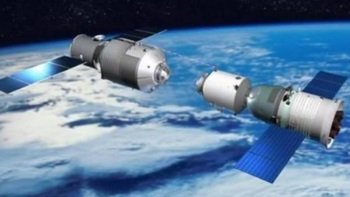
The Indian Space Research Organisation (ISRO) has taken another significant step in advancing India’s space capabilities by acquiring two 400 kg satellites for the upcoming SPADEX (Space Docking Experiment) mission. This mission aims to demonstrate the capability of docking satellites in space—a crucial milestone that will pave the way for future space exploration endeavors, including Chandrayaan-4 and the proposed Indian Space Station.
SPADEX Mission Overview
SPADEX is a pioneering experiment where two satellites will be launched into space on a single rocket but placed in slightly different orbits. These satellites will travel at speeds of approximately 28,000 km/h, aligning themselves in orbit before performing a “space handshake”—a maneuver where the two satellites dock together, forming one unified orbiting unit. This ability to autonomously dock satellites in space is essential for future long-duration missions, enabling complex space operations like in-orbit refueling, space station construction, and deep space exploration.
The Significance of Docking Technology
The ability to dock in space is critical for various space missions, especially those involving space stations. Docking technology ensures that spacecraft can safely connect with a space station to transfer crew, supplies, and equipment. The success of the SPADEX mission will validate ISRO’s capability in autonomous rendezvous and docking, a foundational technology for constructing and maintaining space stations, as well as for potential human space exploration missions. This docking technology will be vital for India’s upcoming space station, projected to be operational by 2028.
Ananth Technologies’ Crucial Role
The two SPADEX satellites were fully assembled, integrated, and tested by Ananth Technologies Private Limited (ATL) at their Bengaluru facility. This marks a significant moment in India’s space program, as it is the first time ISRO has collaborated with a private company for complete satellite assembly. ATL, a long-time partner of ISRO since 2000, has contributed to several Indian space missions, but their involvement in SPADEX signals a growing role for private industry in the country’s space efforts.
Impact of Space Sector Reforms
The collaboration between ISRO and ATL underscores the positive impact of recent reforms in India’s space sector. These reforms encourage increased participation from private companies, driving innovation and efficiency in satellite manufacturing and space mission execution. The successful partnership on the SPADEX mission highlights the potential for the private sector to play a larger role in advancing India’s space exploration goals.
Future Missions and Long-Term Goals
The technologies tested in the SPADEX mission are not just critical for the current mission but also for India’s broader space aspirations. The ability to autonomously dock satellites will facilitate the robotic assembly of large structures in space, such as the Indian Space Station, set to launch by 2028. Furthermore, missions like Chandrayaan-4, which aims to return lunar samples to Earth, will rely heavily on autonomous docking technology.
Next Steps for the Satellites
After their successful assembly, the two satellites have been transported to ISRO’s UR Rao Satellite Centre (URSC) in Bengaluru, where they will undergo further tests and fueling. They will then be shipped to the Indian Spaceport at Sriharikota for final launch preparations. SPADEX represents a major milestone in India’s space journey, highlighting both the technological advancements made and the successful collaboration between the public and private sectors.
In conclusion, the SPADEX mission is poised to be a groundbreaking achievement for ISRO, not only advancing India’s space docking capabilities but also demonstrating the growing importance of private sector participation in the country’s space endeavors. With its success, India moves closer to achieving its ambitious space goals, including the establishment of its very own space station and more complex missions in deep space exploration.

